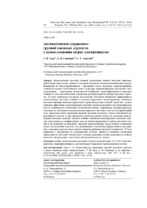| dc.contributor.author | Здор, Г. Н. | ru |
| dc.contributor.author | Синицын, А. В. | ru |
| dc.contributor.author | Аврутин, О. А. | ru |
| dc.coverage.spatial | Минск | ru |
| dc.date.accessioned | 2017-01-31T11:37:40Z | |
| dc.date.available | 2017-01-31T11:37:40Z | |
| dc.date.issued | 2017 | |
| dc.identifier.citation | Здор, Г. Н. Автоматическое управление группой насосных агрегатов с целью снижения затрат электроэнергии = Pump Group Automatic Control for Reducing its Energy Consumption / Г. Н. Здор, А. В. Синицын, О. А. Аврутин // Энергетика. Известия высших учебных заведений и энергетических объединений СНГ. – 2017. – № 1. – С. 54-66. | ru |
| dc.identifier.uri | https://rep.bntu.by/handle/data/27522 | |
| dc.description.abstract | Повысительные насосные станции, оснащенные группой насосных агрегатов, работающих параллельно, являются типовыми объектами системы водоснабжения городов. Повышение их энергоэффективности – актуальная задача, поскольку энергопотребление станций составляет существенную долю в структуре энергопотребления водоканала. Цель исследования – определение возможностей повышения энергоэффективности насосных станций за счет автоматического управления режимами работы группой насосных агрегатов. В статье приведены результаты исследования изменения мгновенной эффективности повысительных насосных станций в условиях переменного водопотребления. Выявлены основные причины снижения эффективности работы насосных станций. Среди них – резкое снижение эффективности регулируемых насосных агрегатов при работе на гидравлическую сеть со значительной статической составляющей напора. Определены основные факторы, влияющие на длительность нахождения регулируемого насосного агрегата в неэффективной зоне. Предложен метод управления группой насосных агрегатов с учетом мгновенной эффективности каждого из них. Проведена апробация данного метода на локальных повысительных насосных станциях. Изучено влияние отключения регулируемого насосного агрегата, находящегося в неэффективной зоне, на общую эффективность работы насосной станции и на изменение ее выходного давления непосредственно после момента отключения насоса. Исследование показало, что своевременное отключение неэффективного регулируемого насосного агрегата может снизить энергопотребление насосной станции на 8–10 % по сравнению с управлением по традиционным методам. Диапазон изменения мгновенной эффективности насосной станции может служить критерием оценки правильности подбора насосного оборудования, а также быть обоснованием для его замены. | ru |
| dc.language.iso | ru | ru |
| dc.publisher | БНТУ | ru |
| dc.title | Автоматическое управление группой насосных агрегатов с целью снижения затрат электроэнергии | ru |
| dc.title.alternative | Pump Group Automatic Control for Reducing its Energy Consumption | en |
| dc.type | Article | ru |
| dc.relation.journal | Известия высших учебных заведений и энергетических объединений СНГ. Энергетика | ru |
| dc.identifier.doi | 10.21122/1029-7448-2017-60-1-54-66 | |
| local.description.annotation | Booster pumping plants, equipped with a group of pump units operating in parallel, are typical objects of the city water supply system. Improving its power efficiency is a very urgent topical objective, because its power consumption is a significant part in the structure of power consumption of water utilities. The aim of the present study is to identify opportunities of improving the power efficiency of pumping stations due to the automatic control of the pump group. The paper presents results of the study of the instantaneous efficiency changes of booster pumping stations under the conditions of variable water consumption. The basic reasons of the reducing pumping plant efficiency are reported in the article. Among them, there is a sharp decline in the effectiveness of the regulated pump units, when they functioning for the hydraulic network with a significant static component of the pressure. The main factors affecting the duration of the adjustable pumping unit in inefficient area are determined. The method of controlling a group of pumping units, taking into account the instantaneous efficiency of each of them was suggested. The approbation of this method at the local booster pumping stations was fulfilled. The effects of disabling the controlled pump unit which is in the ineffective area, on the overall efficiency of the pumping station and on alteration of its output pressure immediately after the pump is switched off are studied. It was shown that the timely shutdown of an inefficiently controlled pump unit can reduce the power consumption of the pumping plant by 8–10% as compared to the traditional control methods. The range of variation of the instantaneous efficiency of the pumping station can serve as a criterion of correct selection of pumping equipment as well it can be the rationale of the necessity for its replacement. | en |

